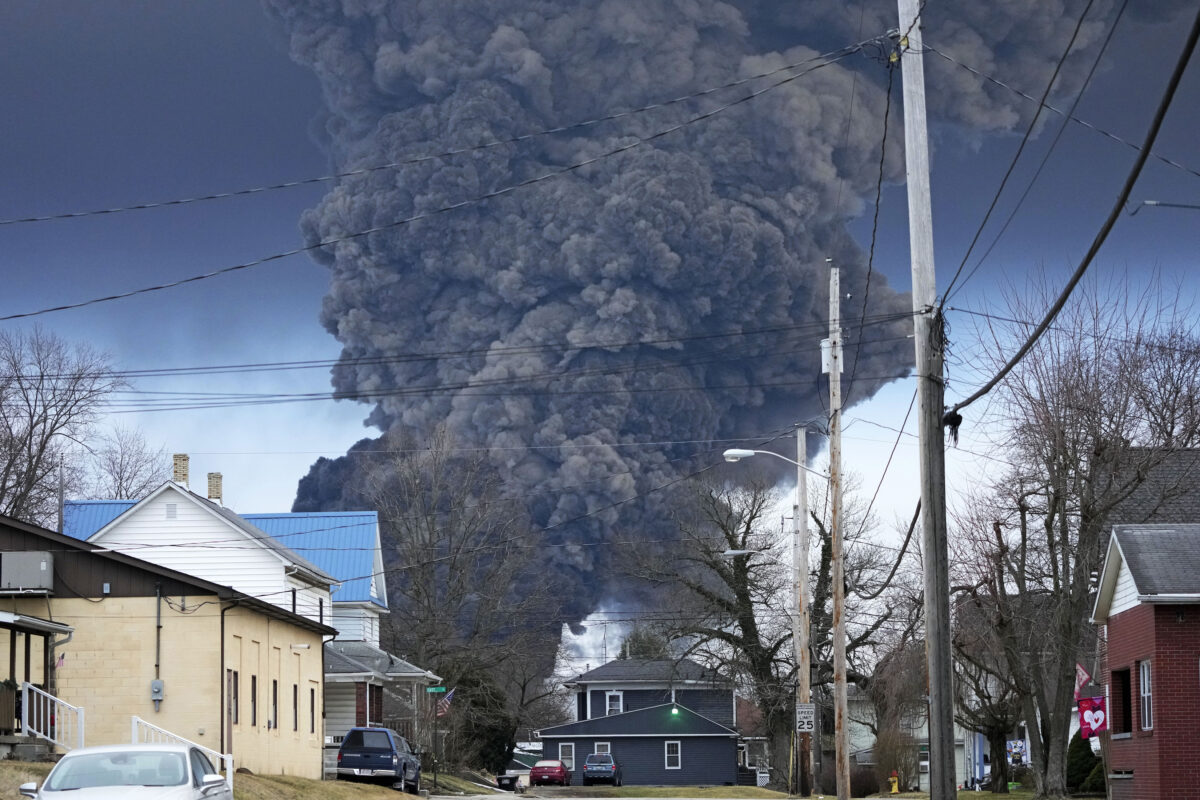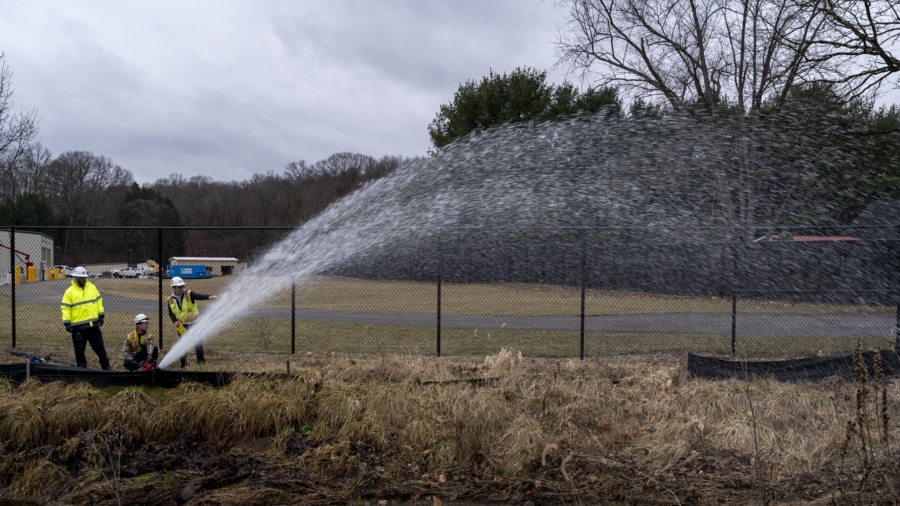A day after alerting Ohio Gov. Mike DeWine that the Norfolk Southern Railway train derailment and chemical spill in East Palestine does not qualify for an emergency declaration, the Federal Emergency Management Agency (FEMA) announced it will send a team to the eastern Ohio village dealing with the disaster’s aftermath.
In a joint statement on Feb. 17, DeWine and FEMA Regional Administrator Thomas Sivak reported that the federal agency has been in “constant contact” with the state and “working together since day one.”
FEMA will dispatch a senior response official and a regional incident management assistance team on Feb. 18 to assess potential long-term recovery needs and other ongoing operations.
On Feb. 3, a 150-car Norfolk Southern Railway freight train was passing through East Palestine when 50 of the cars derailed, including 10 containing hazardous chemicals.

The crash caused lingering fires and sent toxic chemicals into the air. To prevent an explosion, officials decided to drain vinyl chloride from five tanker cars into a trough and then light the substance on fire.
On Feb. 10, the EPA sent a letter to Norfolk Southern describing the chemicals found at the site of the train derailment following the controlled burn.
“Multiple rail cars and tankers were observed derailed, breached, and/or on fire,” the letter noted.
Vinyl chloride is a chemical used to make PVC pipes and other products. The National Cancer Institute notes that vinyl chloride has been linked to cancers of the brain, lungs, blood, lymphatic system, and, in particular, the liver.
The EPA’s letter also mentioned other potentially hazardous chemicals in the derailed tankers.
It specifically notes the presence of ethylene glycol monobutyl ether, ethylhexyl acrylate, isobutylene, and butyl acrylate.
The crash has been attributed to a mechanical issue with a rail car axle.
After the derailment, DeWine implored East Palestine residents to evacuate, saying that anyone who stayed faced “a life or death situation.”
On Feb. 8, DeWine announced that the evacuation order had been lifted.
“Air quality samples in the area of the wreckage and in nearby residential neighborhoods have consistently showed readings at points below safety screening levels for contaminants of concern. Based on this information, state and local health officials determined that it is now safe for community members to return to their residences,” DeWine’s office said in a statement.
On Feb. 16, DeWine’s office released a statement explaining that the governor “spoke with officials at the White House early this morning to address the need for federal help. As a result of this conversation, the Governor has requested assistance from the U.S. Department of Health and Human Services, Health and Emergency Response Team, and the CDC to provide on-the-ground assistance in East Palestine.”
DeWine also said he was informed that East Palestine isn’t eligible for disaster assistance from FEMA because the derailment doesn’t qualify as a traditional disaster, like a tornado or a hurricane, according to the agency.
FEMA spokesperson Jeremy Edwards said on Feb. 16 that the agency is “in constant contact with the emergency operations center in East Palestine and with the Ohio Emergency Management Agency.
“We are closely coordinating with EPA, HHS, and the CDC, who are helping to test water and air quality, and to conduct public health assessments,” Edwards added.
DeWine added on Feb. 17 that the air in 500 homes has been sampled and officials have not discovered any compounds tied to the derailment and chemical spill.
Residents in the East Palestine area who have private wells are encouraged to drink bottled water until their wells are tested, according to the Ohio Department of Health.
Residents Report Ailments
Though officials like DeWine and the U.S. Environmental Protection Agency have said testing shows East Palestine’s air and water are safe, DeWine said on Feb. 17 that the state will establish a medical clinic to examine residents.
Since the derailment occurred, many East Palestine citizens have said they are experiencing headaches, vomiting, skin rashes, and blood in the stool among other ailments.
The U.S. Department of Health and Human Services will send representatives to East Palestine to support the clinic, DeWine added.
The clinic’s location and hours haven’t been announced, but they will be posted on the Ohio Emergency Management Agency website. The first patients will be seen early next week.
“We know that the science says that East Palestine is safe, but we also know that residents are very worried,” DeWine said. “They are asking themselves ‘Is my headache just a headache? Or is it a result of the chemical spill? Are other medical symptoms caused by the spill?’ Those are very legitimate questions and residents deserve answers.”
EPA Administrator Michael Regan met with officials and talked to residents in East Palestine on Feb. 16.
He reiterated that the air and water are safe, and that “robust” air quality testing and around-the-clock monitoring have indicated there are no problems.
A reporter asked Regan if he would feel comfortable living in East Palestine. Regan responded by saying he would if testing showed his home was safe.
“As a father, I trust the science, I trust the methodology that the state is using,” Regan said.
“I would encourage every family in this community to reach out to the state or EPA to get their home air quality tested and their water tested,” Regan added. “We have the resources to do it, we want to do it and we want people to feel secure and safe in their homes.”
Not everyone agrees with Regan’s claims.
On Feb. 16, Sen. J.D. Vance (R-Ohio) released a video showing him standing at Leslie Run Creek in East Palestine.
Visited a local creek in East Palestine today. These waterways are still very polluted. It’s time for Norfolk Southern to finish the cleanup. Check this video out: pic.twitter.com/4lsHBmrMJj
— J.D. Vance (@JDVance1) February 16, 2023
Vance took a stick and scraped the bottom of the shallow creek, bringing rainbow-colored substances to the surface.
“There are dead worms and dead fish all throughout this water” and “chemicals coming out of the ground,” Vance said. “This is disgusting. And the fact that we have not cleaned up the train crash, the fact that these chemicals are still seeping into the ground is an insult to the people who live in East Palestine.”

Jami Cozza’s family has lived in East Palestine for several generations near a creek that is now contaminated by toxic chemicals from the crash.She told The Epoch Times that, initially, Norfolk Southern conducted air testing and told her it was safe to return home. She is currently staying at a hotel paid for by the railroad.
“I asked for additional water and soil testing, and they [Norfolk Southern] agreed and sent a senior toxicologist,” Cozza explained. “He told me that my house was not safe and that I shouldn’t return.
“I’m vocal and had I not used my voice and thrown a fit, I would be sitting in that house with my 3-year-old daughter breathing the toxic chemicals,” Cozza said. “How many children—how many people—are inside their homes and are in danger? How can any of us trust the railroad? I don’t trust them.”
From The Epoch Times


